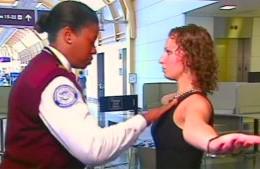 A few months back, this site carried information on what breast cancer survivors could expect during the airline security screening process.
A few months back, this site carried information on what breast cancer survivors could expect during the airline security screening process.
I recently came across this very detailed article from the Transportation Security Administration (TSA) and am sharing it as today’s post.
The TSA understands that passengers who are breast cancer survivors may have concerns about the screening process.
TSA will make every effort to accommodate a person’s needs and to treat all passengers with respect and dignity, all travelers must undergo security screening for airline travel so that we are all protected.
What Choices Do You Have In The Screening Process?
- During screening, you have the option of undergoing screening by use of advanced imaging technology or a pat-down. Metal detectors are still in use in all airports.
- If you elect to undergo a pat-down, imaging technology shows an anomaly, or if you alarm a metal detector and therefore require additional screening, you may request that the pat-down necessary to resolve the alarm take place in a private screening area.
- You may request that a traveling companion be present as a witness during the pat-down whether it occurs in the public or a private screening area.
- If you are unable to stand, or to remain standing, during the pat-down you may request to sit while the screening procedure takes place.
What Else You Should Know About The Screening Process.
-
You may tell the TSA security officer that you would greatly appreciate that your screening be handled as discreetly and quietly as possible.
- You should neither be asked to nor agree to lift, remove, or raise any article of clothing to reveal your breast prosthesis, and you should not be asked to remove it.
- If the security officer’s gloves alarm for explosives after conducting your pat-down, you will need to undergo additional screening.
- You are free to ask the security officer about the screening process and screening equipment.
- If you decide to bring your prosthesis or mastectomy bra in your accessible property rather than wearing it, it will be allowed through the checkpoint after it is screened. The prosthesis or the mastectomy bra is not subject to the 3-1-1 rules normally applicable to liquids, gels, and aerosols because it is considered to be medically necessary. You may also ask that your bag be screened in private.
What Should I Do To Facilitate The Screening Process?
- If you are comfortable stating that you are a breast cancer survivor who wears a breast prosthesis, please let the security officer know. You may also use a travel communication card which provides this information in writing and show it to the security officer instead of, or in conjunction with your conversation with the security officer. To assist you in this process, TSA recently made a notification template available which can be found at by clicking here. Use of the notification card does not exempt anyone from screening, but the cards do provide a mechanism to protect passengers’ privacy and to communicate with TSA personnel more discretely.
- If you believe that you may have difficulty undergoing the screening process, you may contact the Customer Support and Quality Improvement Manager located at each airport before or after arrival. They should be available to assist you through the screening process. The airport you are departing from should be able to provide their contact information.
- If the screening officer is not responsive to your requests for information, or you are dissatisfied with your screening process for other reasons, you may ask to speak with a supervisor.
 A few months back, this site carried information on what breast cancer survivors could expect during the airline security screening process.
A few months back, this site carried information on what breast cancer survivors could expect during the airline security screening process. 
